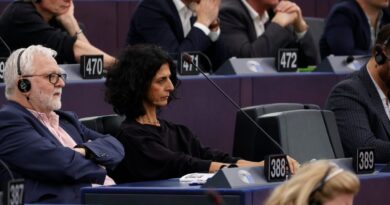Alf Dubs — Holocaust survivor and Labour peer — calls for ceasefire in Gaza
Press play to listen to this article
Voiced by artificial intelligence.
LONDON – Labour peer Alf Dubs, who fled Nazi occupation and came to the UK on the Kindertransport in 1939, has called for a ceasefire in Gaza.
Speaking on POLITICO’s Westminster Insider podcast, Dubs said the conflict in the Middle East is a “painfully difficult issue,” adding “we have to go for a ceasefire.”
He said “The deal has to be a ceasefire, the hostages must be released, and food and supplies have to get into Gaza.”
With his comments, Dubs — who served as a Labour MP from 1979 to 1987 and is the former director of the Refugee Council — joins a number of Labour politicians calling for a ceasefire, including 15 frontbenchers.
Labour Leader Keir Starmer has so far resisted calls for a ceasefire, saying in a recent speech that he understood the concerns at the loss of life in Gaza but arguing a ceasefire would only “embolden Hamas” and that the “only credible approach” was to back temporary humanitarian pauses in the fighting.
Asked if the conflict is especially difficult for him to watch, having fled his home city of Prague aged seven as the Nazis approached, Dubs said “[watching] fellow human beings suffering, whether it is Israelis or Palestinians, I find it incredibly painful, and I suppose — given my background — it’s even closer to me. Sometimes I can’t even look at the news anymore, it’s just a terrible terrible situation.”
“We still have got to figure out how to get negotiations going and move towards some peaceful progress,” he added, describing the conflict as “terribly painful for the Israelis, painful for the Palestinians; all the people are losing except for Hamas.”
“The Palestinians in Gaza are not all Hamas supporters, and they deserve a better life, as do the Israelis,” he told the podcast.
Thousands of Jewish children including Dubs were rescued from Nazi occupied Germany, Austria, Czechoslovakia and Poland by the Kindertransport escape route in the months leading up to the Second World War.



